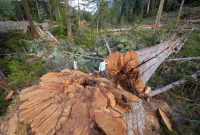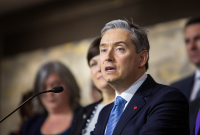Support strong Canadian climate journalism for 2025
An Ottawa-based real estate firm has asked a Swiss court to shut down a campaign that has sought to link it to alleged corruption in Malaysia.
The injunction requested by Sakto Corporation on Aug. 20 in civil court in Basel, Switzerland is of sweeping proportions, demanding that the Basel-based non-government organization Bruno Manser Fonds (BMF) remove more than 250 publications and 1,100 “infringing statements” from the public domain.
BMF, named in honour of the late Swiss environmentalist Bruno Manser, has been running a campaign against deforestation in the Malaysian state of Sarawak. It says Indigenous peoples there have had their land taken from them "while others are profiting from the proceeds."
Sakto is owned by Jamilah Taib Murray and her husband Sean Murray, and counts among its holdings Preston Square, which consists of three office towers and a condominium complex west of downtown Ottawa.
"BMF's campaign is based on false allegations," reads a press release by the firm. "The impression that they have created of Sakto is wrong and damaging to the company’s reputation and business."
'Corruption' allegations in court
BMF has alleged that Taib Murray's father Abdul Taib Mahmud, a Malaysian government official, "has been guilty of systematic corruption for a number of years and has enriched himself very greatly as a result," as described in a separate February 2018 Ontario Superior Court decision.
Sean Dunphy, the judge in that decision, wrote that Taib Murray and her husband "have founded and operated what has become a fairly large group of real estate companies that are referred to for convenience as the Sakto Group."
"The applicants allege that the Sakto Group was founded with and has been significantly funded over the years by proceeds of the allegedly corrupt activities of Mr. Taib in Malaysia," wrote Dunphy.
In that case, Dunphy said "much" of the "large volume of information" relating to corruption allegations "is of the hearsay variety" and none have been proven in court. He also said the applicants “concede they do not yet have sufficient evidence” to pursue an investigation into a “possible private prosecution of certain individuals or corporations in Canada."
He dismissed BMF's application to order some Canadian banks and investment firms to reveal confidential information. He wrote that "the links between the assets of the Sakto Group in Canada and the alleged corruption of Mr. Taib in Malaysia depend upon conjecture and suspicion more than evidence."
Corruption allegations also appeared in a confidential 2006 diplomatic cable released by Wikileaks. U.S. embassy staff wrote that "Taib and his relatives are widely thought to extract a percentage from most major commercial contracts, including those for logging, awarded in the state."
It named as its sources "embassy sources outside the government" as well as Mohammad Herman Ritom Abdullah, then the human rights commissioner for the state of Sarawak.
Sakto wants to restore reputation
Sakto's legal counsel says the "Sakto Group" of companies described in the court filing does not exist.
"There is no Sakto Group," Duncan Fraser, counsel to Sakto Corporation, told National Observer. He said Sakto is "100 per cent" owned by Canadian citizens and does no business outside Ontario, and he said the separate corporate entities are meant for liability purposes.
“The way buildings work, there’s Sakto Corp., and there’s Sakto Development Corp. And then, when you build a building, you incorporate a separate numbered company, obviously, for liability purposes. Those are all individual, single-purpose structures. But the ‘Sakto Group’ that you’re referring to is trying to tie this into other countries.”
The company has said through its Sakto-financed website, TheFactsMatter.ca, that its injunction "is the first step in Sakto's legal campaign aimed at re-establishing the facts and restoring its own reputation.”
“All of the allegations, all of the statements that are being made to suggest corruption or money laundering...none of the allegations that has been made is supported by a fact," said Fraser.
He also dismissed the Wikileaks cable as the "opinions of political opposition" and said it was therefore "inappropriate" to connect it to allegations of corruption.
Attempts by BMF to initiate law enforcement investigations in Malaysia, Switzerland, Germany, the United Kingdom, Australia, and Canada have all failed. Nonetheless, BMF’s executive director, Lukas Straumann, expressed confidence that his organization will not be silenced.
“I am absolutely confident that the laws in Switzerland will side with us,” Straumann said in an interview with National Observer. “I think it’s stupid of them to do this. Obviously, they think they can shut us up, or bankrupt us. Maybe that’s their strategy. But it won’t work.”

Canada’s handling of complaint prompted concern
The court cases in Switzerland and Ontario have not been the only legal action between Sakto and BMF.
The environmental group also filed a complaint against Sakto to a Canadian committee set up as a non-judicial grievance mechanism for Canada's membership in the Organization for Economic Cooperation and Development (OECD).
Canada's OECD "National Contact Point," as the committee is known, is chaired by Global Affairs Canada and is a voluntary process. Relying on good faith, it hears complaints by individuals and organizations against multinational enterprises.
The May 11, 2018 final statement from the committee lays out BMF's allegations that there is a "Sakto Group" and that it is "comprised of a number of corporations operating in Canada and in foreign jurisdictions," and suggests it "did not voluntarily apply the disclosure provisions" contained in OECD guidelines.
The complaint was ultimately rejected, because the committee said it concluded its offer to facilitate dialogue "would not contribute to the purposes and effectiveness of the guidelines." It then accused BMF of releasing a "confidential" draft initial assessment during the process.
However, the Canadian government’s handling of the NCP complaint process has raised concern at OECD Watch, a Netherlands-based group with a membership of more than 100 civil society organizations in 55 countries.
OECD Watch claims that the Canadian government initially considered BMF’s concerns to have merit, but then removed criticism of Sakto from earlier statements.
On May 11, the Department of Justice sent a letter to BMF and OECD Watch telling them to remove the draft document from public access. On May 29, the Canadian NGO MiningWatch Canada received a similar “cease and desist” letter from the committee. MiningWatch and OECD Watch have accused Canada of “heavy-handed action."
The actions on the part of Sakto and the Canadian government have caught the eye of the OECD itself. The day after Sakto initiated its legal action against BMF in Switzerland, the OECD Secretary General, Angel Gurría, confirmed in a letter to BMF and OECD Watch that he had written to the Canadian minister of international trade “to better understand developments,” and that his staff had followed up with Canadian authorities.
No plans to pursue further action

At this stage, with no legal judgments against Sakto Corporation, and no investigations underway, BMF has been put on its heels. With the Swiss case, it is now in the very different position of having to defend itself. Straumann told National Observer that BMF has no plans to pursue further action in Canada.
In January, the federal government announced it would be establishing an Ombudsperson for Responsible Enterprise (CORE), and that the new position would be the first of its kind in the world. Nine months later, however, it has yet to be filled.
“We’re waiting for an appointment,” said Jamie Kneen, communications and outreach coordinator at MiningWatch. “Once there’s an ombudsperson in office, we’ll decide which cases to pursue.”
Meanwhile, Straumann says he is prepared to face Sakto’s legal action in Switzerland.
“We have plenty of evidence,” he said. “We are looking forward to presenting that evidence in court. For us, it is fantastic that they’ve brought this fight to our home turf.”
Editor’s note: This story was updated at 11:30 a.m. EDT on Oct. 15, 2018 to add comments from an interview with lawyer Duncan Fraser and additional information about BMF, Sakto, Wikileaks, the Ontario Superior Court decision and the OECD committee. It also changed the description of the legal action to “injunction” and removed information from a draft document and an interview that could not be independently verified. It also changed the lead photo to obscure personally-identifying information.








Comments
Follow the money honey! Canadian banks and investors are notoriously lax in due diligence and have been roundly criticised elsewhere for money laundering among other sins. Canadian governments, so desperate for foreign investment, become complicit in corruption though inaction - fearing to turn off the tap. This is certainly evidence that we are not as sovereign as we like to think - the colonialism has just changed shape!